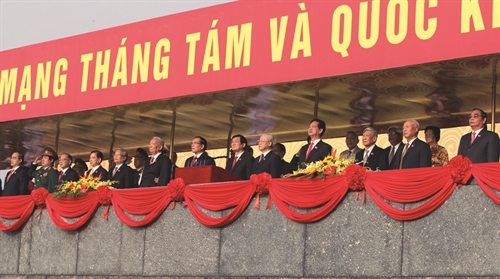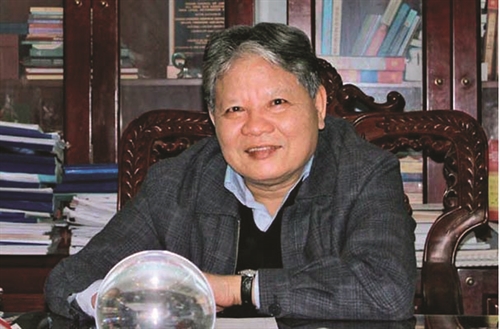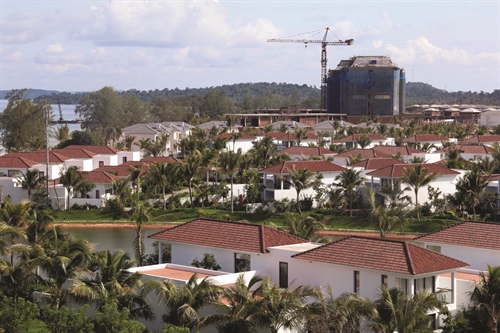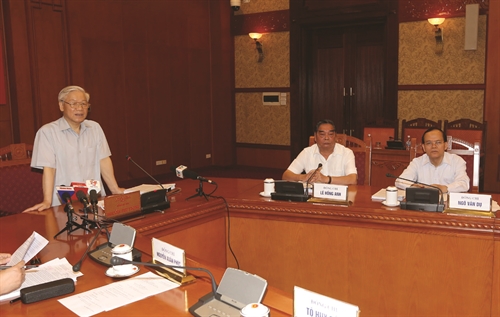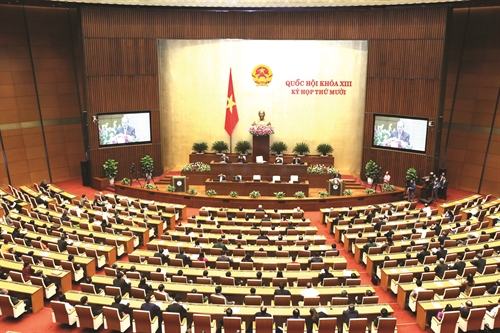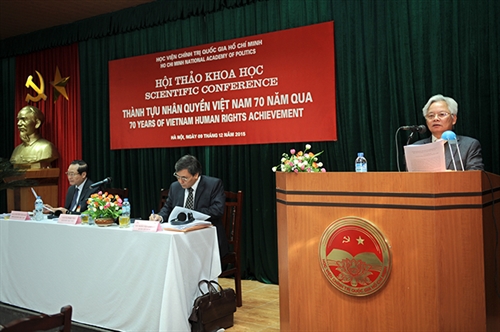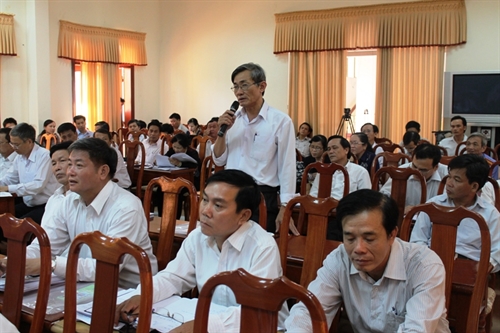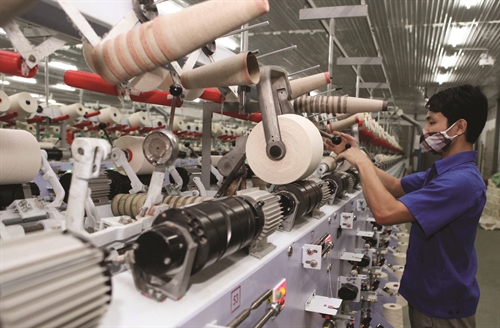The Trans-Pacific Partnership (TPP) deal will facilitate trade and investment, bringing more benefits to production, business, workers and consumers, Prime Minister Nguyen Tan Dung said in a recent article.
In the article, entitled “The TPP, opportunities and challenges - Our action,” Prime Minister Dung wrote that the TPP was a comprehensive market-access deal that ensured freer movement of commodities, services, capital and technology through commitments to remove export-import tariffs and non-tariff barriers and create a fair and non-discriminatory business environment.
 |
| Workers make clothes for export at the Song Da Export Garment Joint Stock Company, Hoa Binh province__Photo: VNA |
Signed last month by 12 member states, including Vietnam, the agreement will promote the formation of a new manufacture and supply chain, facilitate internal trade, improve economic efficiency, promote growth, and support employment creation, as well as increase incomes and improve people’s lives, thus tackling the challenges of a contemporary economy.
The deal also encourages innovation, development of a digital economy, elaboration of competition policies and operation rules of state enterprises, and protection of the environment and fundamental rights of workers.
It also offers opportunities for member economies at different development levels and enterprises of all sizes to benefit, thus helping small- and medium-sized enterprises to overcome challenges and seize opportunities to develop.
The TPP covers commitments on technical assistance, capacity building and flexibility in implementation roadmaps suitable to different development levels of the member states so that they can fulfill their commitments and fully benefit from the agreement. It also prescribes implementation supervision mechanisms and sanctions for violations.
The TPP respects the political regime of every country, and acknowledges a requirement to fully abide by countries’ laws in line with international commitments exclusive of defense and security terms. The deal is also expected to create a new foundation for regional economic integration and offer opportunities for other Asia-Pacific countries.
The TPP, along with the European Union-Vietnam Free Trade Agreement (FTA), would propel new momentum in the country’s socio-economic development, especially in attracting investment and promoting export with the world’s largest economies, including the 28-member European Union with over USD 18 trillion, and the 12-member TPP with more than USD 20 trillion, in GDP.
The Government leader emphasized that joining the above agreements marked a new progress in pursuing a foreign policy of independence, self-reliance, multilateralization and diversification of ties in order to improve Vietnam’s international status, especially in a region facing fiercer strategic competition.
Challenges and role of entities in tackling challenges
The TPP and other FTAs would, in addition to opportunities, pose new challenges for Vietnam not only in the markets of the TPP member states but also in the domestic market, especially competition in institutional quality and business environment, the Prime Minister said.
He warned that fierce competition would make enterprises with poor performance in transformation and restructuring to be on the verge of being dissolved or going bankrupt, and make a segment of workers to face unemployment, noting that agriculture and farmers would be the most vulnerable.
The income gap would be widened if the rapid, sustainable development strategy did not produce effective results and the people did not benefit from growth outcomes, the cabinet leader said.
Another obstacle lies with the process of effectuation, from improving the legal system to personnel training and increasing the capacity of cadres as well as technical and legal experts.
To seize the opportunities and overcome the challenges, the Prime Minister urged the raising of the competitiveness of the entire economy and clear determination of the role and actions of related entities.
Businesses would determine micro-competitiveness and reflect the strength as well as the competitiveness of the economy, Dung said, suggesting the business sector be courageous and compete, while taking the initiative to take synchronous and drastic measures to raise the competitiveness of its goods and services.
Researches and realities in different countries show that a national administration institution is decisive to macro-competitiveness and the development of an economy. Institutional quality will determine the growth and sustainability of the economy. Good institutions will help bring into full play the concerted strengths and resources for development and therefore, they play a decisive role in the effectiveness and competitiveness of businesses.
To have a high-quality institution, the Government leader pointed to the need to soundly define the relationship between the State, market, enterprises and society.
The State has to stabilize the macro-economy, build the legal system and organize the management apparatus in order to create an open, transparent business environment and ensure business freedom and fair competition.
“The market decides on the mobilization, allocation and effective use of resources. Enterprises have the right to do business in the fields not banned by law. They must improve their social responsibility and business culture,” the article says.
Meanwhile, through people and their representative organizations and associations as well as experts and independent researchers, the society could help elaborate, and supervise the enforcement of, policies so as to reduce the weaknesses of the State and the market, the cabinet leader wrote.
He suggested the improvement of the business climate be included in the institutional reform requirement, saying the business environment could not be favorable without appropriate institutions.
Only the rational renewal of the national administration institution can help raise the competitiveness of products, enterprises and the whole economy and seize the opportunities to be brought about by the TPP and new-generation FTAs, reads the article.
To ensure success in international integration and efficient implementation of FTAs, especially the TPP and Vietnam-European Union FTA, the Prime Minister urged the issuance of resolutions of the Party and the National Assembly and specific action plans from the Government, ministries, sectors and the business community.
He also underlined the significance of effective communication work to create a consensus in consciousness and unity in action, as well as of efforts to increase the national competitiveness for fast and sustainable economic development.
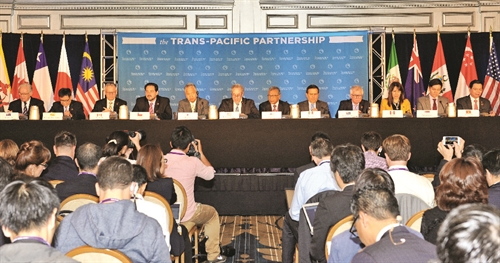 |
| Minister of Industry and Trade Vu Huy Hoang (right) and trade ministers of 11 other nations joining the TPP negotiations at a joint press conference to announce the success of the negotiations in Atlanta city (the U.S.)__Photo: Thanh Tuan/VNA |
Labor issues in TPP
Responding to questions recently raised by National Assembly deputies on labor issues in the TPP, the Prime Minister gave written answers pointing out that in the context of globalization, greater importance has been attached to guaranteeing the interests of workers as they are directly engaged in the process of making products and services in international trade so they should benefit from, and share the outcomes of, this process.
Specifically, workers should have their fundamental rights, interests and working conditions guaranteed, the Prime Minister said, noting that the inclusion of labor issues in FTAs also aimed to ensure an equal competitive environment for all parties in trade relations.
Compliance with international standards on labor was always mentioned in new-generation FTAs. Like other FTAs, the TPP does not set out separate standards on labor but only reaffirms the labor standards set out in the International Labor Organization (ILO) 1998 Declaration on Fundamental Principles and Rights at Work which all TPP member states must respect, promote and implement as members of the ILO, the Prime Minister stressed.
These standards include (i) freedom of association and the effective recognition of the right to collective bargaining; (ii) the elimination of all forms of forced and compulsory labor; (iii) the effective abolition of child labor and a prohibition on the worst forms of child labor; and (iv) the elimination of discrimination in respect of employment and occupation.
Legal compliance
The Vietnamese legal system has basically complied with the ILO’s standards and TPP’s commitments on the elimination of all forms of forced and compulsory labor and elimination of discrimination in respect of employment and occupation, the Prime Minister said, adding the country has been implementing national action programs for realization of these standards.
The country’s legal system also has adequate provisions on working conditions related to minimum wages, hours of work and occupational safety and health, he said.
To better guarantee fundamental rights of workers, the Government leader affirms Vietnam’s determination to carry on improving laws and relevant mechanisms, such as imposing criminal penalties on acts of using forced or compulsory labor; prohibiting discrimination in respect to employment and occupation; guaranteeing women’s right to equal access to employment; and scrapping regulations prohibiting women to be engaged in certain occupations and jobs.
Workers’ representative organizations
Vietnam and other TPP member states have to respect and guarantee the right of workers in the formation of and admission to workers’ organizations at the grassroots.
The Government leader said a grassroots workers’ organization may opt to join the Vietnam General Confederation of Labor, or register with a competent state agency in order to officially operate. This organization may operate only after the competent state agency accepts such registration in a transparent process specified in relevant legal documents.
After completing the registration formalities, a workers’ organization will have certain autonomous rights in compliance with regulations of the ILO and Vietnam’s law. Both the ILO and TPP require all workers’ organizations to comply with the constitutions and laws of host countries and operate according to their registered purposes.
According to the ILO’s standards, a workers’ organization must represent and protect the rights and interests of workers in enterprises in lawful forms of interaction, including dialogue, collective bargaining, strike, and other collective activities in labor relations.
This organization is prohibited from carrying out activities that are likely to harm national security or social order and safety and participating in any activities other than those complying with the ILO’s regulations and registered with a competent state agency.
The TPP also has provisions aiming to protect the workers’ organization from being interfered or discriminated by the employer for the purpose of nullifying or weakening its capacity to represent and protect workers; and ensure the employer’s obligation to conduct goodwill bargaining with the workers’ organization about wages and other working conditions for workers.
After five years from the date the TPP becomes effective with respect to Vietnam (meaning seven years from the date it is signed), grassroots workers’ organizations may join or together establish workers’ organizations at a higher level, sectoral or regional, according to a legally established transparent registration process. These higher-level workers’ organizations must also operate in accordance with Vietnam’s law and the ILO’s regulations.
Actions of Vietnam
The Prime Minister stressed the need to strengthen the Party leadership of labor relations in general and trade unions in particular.
The Vietnam General Confederation of Labor will work out specific plans for renewing and raising the operation efficiency of trade union organizations at all levels, especially at the grassroots.
The Government will apply synchronous solutions for improving the organizational apparatus and increasing the leadership of related institutions such as labor inspectorate and state management agency in charge of trade unions and labor relations.
The Party Central Committee will issue a resolution on effective international integration in the context when Vietnam accedes to new-generation FTAs, which will touch on labor and trade union issues, the cabinet leader said.
He said the TPP’s labor issues should be approved by the member states according to a separate approval process of every state. It will take around two years for the states to approve the agreement so that they can prepare necessary conditions for effective implementation of the agreement. Particularly, Vietnam will have additional five years to make careful preparations for fulfilling its obligations, the cabinet leader assured the lawmakers.
After competent authorities approve the TPP and set out implementation solutions, the country will revise legal documents or issue new ones to facilitate the implementation of the agreement’s labor issues in compliance with the ILO’s regulations.
Based on the principles set upon the agreement approval, the Government will issue legal documents and assign specific tasks to state management agencies to implement the TPP’s labor-related regulations in line with national law and ILO’s standards, the Prime Minister said.- (VLLF)
